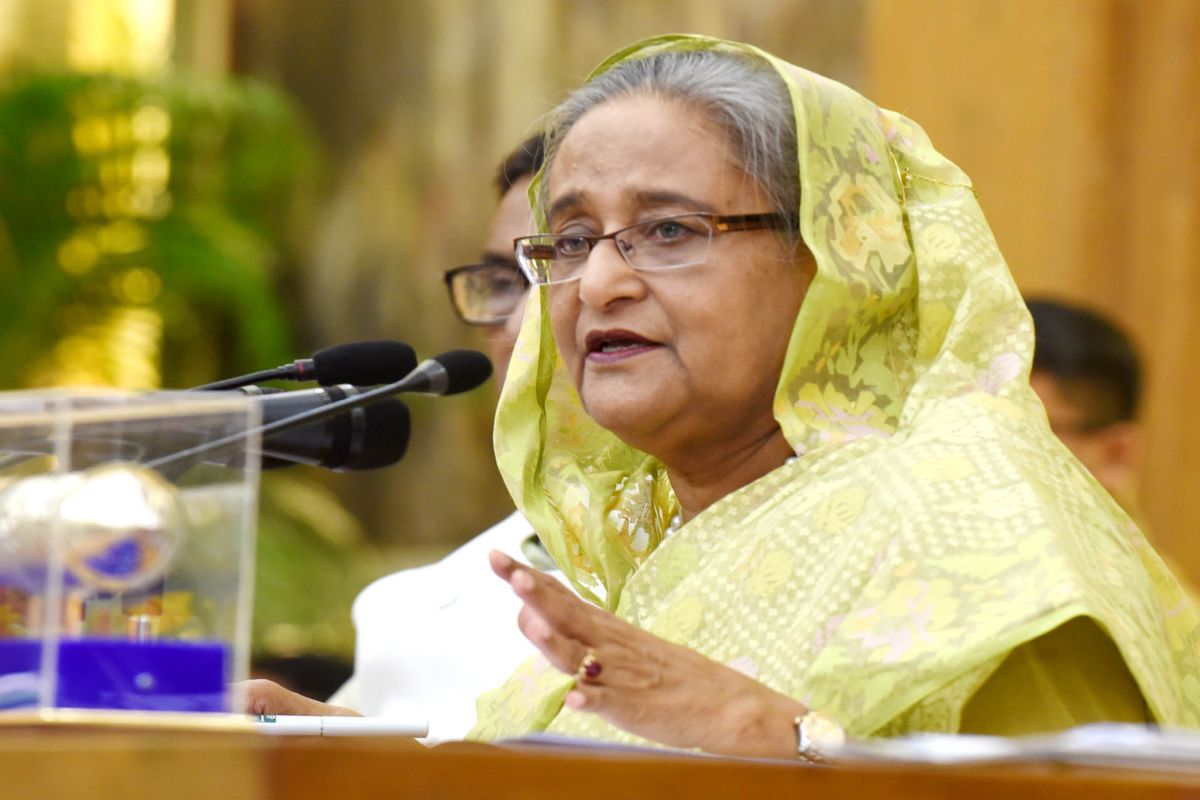When Irrfan moved to tears by Nawazuddin’s performance in New York
Discover how Nawazuddin Siddiqui's powerful performance in 'New York' brought Irrfan Khan to tears, revealing a touching moment on set.
PM urges UN, also calls for an immediate end to Russia-Ukraine war

Bangladeshi Prime Minister Sheikh Hasina (Photo: IANS)
Calling upon the United Nations to play an effective role in solving the Rohingya crisis, Prime Minister Sheikh Hasina has warned that the problem may affect the security and stability of the entire region, and beyond if it persists.
She made the call while delivering her speech in the 77th session of the United Nations General Assembly on Friday.
Like the previous years, she addressed the UNGA in Bangla. The theme of this year’s general debate is “A watershed moment: transformative solutions to interlocking challenges”.
Advertisement
Hasina said Bangladesh last month marked five years of the 2017 Rohingya mass exodus.
“Not a single Rohingya was repatriated to their ancestral home in Myanmar, despite our bilateral engagements with Myanmar, discussions with partners in trilateral format and engagements with the UN and other partners to assist Myanmar to create necessary conditions for safe and dignified repatriation,” she said.
The PM said the ongoing political turmoil and armed conflicts in Myanmar has made the Rohingya repatriation more difficult.
She said the prolonged presence of the Rohingyas in Bangladesh has caused serious ramifications on its economy, environment, security, and socio-political stability.
“Uncertainty over repatriation has led to widespread frustration. Cross border organised crimes including human and drug trafficking are on the rise.”
She expressed concern that this situation could potentially fuel radicalisation.
Talking about the Ukraine-Russia war, she demanded an immediate end to the fighting and resulting sanctions for the sake of lives and livelihoods of the people throughout the world.
“We want the end of Russia-Ukraine war. Due to sanctions, and counter-sanctions, not a single country, rather the entire mankind including women and children is punished,” she said.
The PM mentioned that the impact of the war does not remain confined to one country, rather puts the lives and livelihoods of the people of all nations in greater risk, and infringes their human rights. “People are deprived of food, shelter, healthcare and education.”
Hasina said children suffer the most in particular and their future sinks into darkness. “I urge the conscience of the world community — stop the arms race, war and sanctions. Ensure food and security of the children. Establish peace.”
The premier said she wanted to see a peaceful world with enhanced cooperation and solidarity, shared prosperity and collective actions. “We share one planet, and we owe it to our future generations to leave it in a better shape.”
She said all believe that antagonism like war or economic sanctions, counter-sanctions can never bring good to any nation. “Dialogue is the best way to resolve crises and disputes.”
In this regard, the PM thanked the UN secretary-general for setting up the Global Crisis Response Group.
“As a champion of this group, I am working with other world leaders to determine a global solution commensurate with the gravity and depth of the current situation.”
Hasina said the Ukraine-Russia war, economic sanctions and counter-sanctions led to a supply chain disruption and exorbitant price hike of fuel, food and consumer goods.
“This has put the economy like ours under tremendous pressure. Inflation has increased. We are taking various initiatives to overcome this situation,” she noted.
Regarding the impact of climate change, the PM said it is one of the biggest threats to humankind.
She said the Bangladesh government has taken many transformative measures to tackle the perilous impacts of climate change consistent with the Paris Agreement and the Sustainable Development Goals.
During Bangladesh’s presidency of the Climate Vulnerable Forum, it launched Mujib Climate Prosperity Plan, which aims to put Bangladesh on a sustainable trajectory from vulnerability, Hasina said.
“Our national plans and policies on climate change and natural disaster are gender responsive, and take into account the critical role of women in adaptation and mitigation.”
The PM said Bangladesh is ready to support other vulnerable countries to develop their own prosperity plans. She called upon the world leaders to promote inclusive climate action.
She reiterated Bangladesh’s zero tolerance policy on terrorism and violent extremism.
“We do not allow our territory to be used by any party to incite or cause terrorist acts or harm others,” she said.
The premier also called upon the UN member states to work together for the conclusion of an internationally-binding instrument to tackle cybercrimes and cyber-violence.
Hasina said Bangladesh as a responsible UN member state is fully committed to protecting and promoting the human rights of its own people. “We have adopted a holistic and inclusive approach to ensure the political, economic, cultural and social rights of the people.”
She said Bangladesh is interested in looking for transformative solutions to poverty alleviation, mitigating climate change effects, preventing conflicts and finance, energy, and fuel crises that the world is grappling with now.
The PM, however, pointed out that socio-economic development cannot be achieved without ensuring peace and stability.
Hasina said Bangladesh will continue to extend its support to the Palestinian people.
She reiterated Bangladesh’s unequivocal support for the two-state solution based on pre-1967 borders and the establishment of a Palestinian state with East Jerusalem as its capital.
She indicated that the greatest lesson learnt from the pandemic is that “until all are safe, no one is safe”.
“We must use the hard-earned lessons to stimulate critical and much needed reforms of our institutions, including of the United Nations, to better prepare for such calamities in the future,” the premier said.
Advertisement